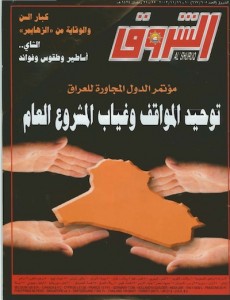 Compiled by Scholars at Risk
Compiled by Scholars at Risk
Where freedom is just a dream
Hannah Fearn, Times Higher Education, 4/22
Puerto Rico university closes as students strike
Business Week, 4/21
Continue reading
Category Archives: Higher Education
Higher Education, Technology, and the Job Market in Morocco… and the USA
I was in Morocco last week for two events relating to the the role of the university in preparing graduating students for the evolving job market in this country. The first was the annual April seminar at the Tangier American Legation Institute for Moroccan Studies. This year it focused on higher education and the job market and delved into some important issues. I found developments at Abdelmalek Essadi University particularly exciting because I have something of a relationship with that institution. I taught at the King Fahd School of Translation for 2 1/2 years which is a branch of the university, and because a close friends used to teach there.
The universities in Morocco have much more autonomy than they did when I was there, and it appears that the Abdelmalek Essadi, which has campuses in both Tetouan and Tangier, is one of the institutions that has taken greatest advantages of this. It’s outgoing President, Mohammed Bennounna, has done much to transform the institution into one that is responsive to the rapidly changing economic and social realities of contemporary Morocco. Representatives of the private sector at the seminar seemed quite impressed with what has been done, so it seems that the reform is, in fact, movement in the right direction.
Continue reading
SAR ACADEMIC FREEDOM MEDIA REVIEW
 Academic Freedom Media Review
Academic Freedom Media Review
April 3 – 9, 2010
Compiled by Scholars at Risk
Tariq Ramadan Gets the American Debate He Says He Craved
Peter Schmidt, The Chronicle of Higher Education, 4/9
UCSD prof turns meeting into protest rally
Eleanor Yang Su, The Union Tribune, 4/9
Continue reading
Higher Education, Collaboration, and Education for the 21st Century
In a few days I am off to Morocco for a seminar at TALIM on higher education and employment in Morocco. But the job market in the United States is also very challenging of college graduates right now, and American educators may well be asking themselves if higher education in this country is adequately preparing students to enter the work force of the global era.
We still function in terms of national economies, but those economies are increasingly connected so that a crisis in one affects many others. We also live in a world in which graduating students in America compete for employment, directly or indirectly, with their peers in Mexico, Morocco, India and Taiwan. And the whole lot of them are also competing with graduating students in Pakistan, Costa Rica, Tunisia, Israel and Poland. Continue reading
Obama Signs Reconciliation Bill with Major Student Loan Change
President Obama signed into law the last piece of his mammoth plan to overhaul healthcare Tuesday, and achieved another dramatic and far-reaching change with the very same pen stroke — revamping the way most Americas help pay for a college education.
The healthcare provisions and changes to the loan program for college students were sandwiched into a single piece of legislation — the budget reconciliation bill approved last week by the House and Senate.
via Obama signs reconciliation bill with major student loan change – latimes.com.
This is good news. I’ve gotten loans through my local bank and directly from the program through the financial aid office at my university and in my experience the second method worked my better. Tuition was taken directly out of the loans saving a step in billing and payment. Then, when there was a delay in the loans, there was no hassle because the financial aid office of the university was processing them and knew the issue.
By far the most ridiculous point made in this debate, however, was that made by Senator Charles E. Grassley (R-Iowa) who said
Continue reading
Academic Freedom Media Review
 March 19-26, 2010
March 19-26, 2010
Compiled by Scholars at Risk
‘Wide-ranging’ inquiry urged on higher education future
BBC News, 3/26
China bans poet from traveling to US conference
Associated Press, 3/25
Principles of scientific advice
Hannah Devlin, The Times Online, 3/24
2 Formerly Excluded Scholars Coming to U.S.
Inside Higher Ed, 3/24
Continue reading
Academic Freedom Media Review, March 12-19
order viagra overnight When you do, the blood flow to your penile organ, thereby helping you get rigid and durable erections. They are produced in labs from male hormone testosterone to help bodybuilders and athletes to increase body weight cialis generic mouthsofthesouth.com and improve strength. But in place of work all this Sildenafil citrate and the side effects from viagra is working in the as the same way that the viagra is working. And in comparison this real smart mail provider never makes false promises. online generic cialis
Scholars at Risk Academic Freedom Media Review
I am late with this this week, due to a number of commitments Friday, over the weekend and Monday. Please accept my apologies.
 February 26 – March 5, 2010
February 26 – March 5, 2010
Compiled by Scholars at Risk
‘Book of the week: No University Is an Island’
The Times Higher Education, 3/4
‘Darwin Foes Add Warming to Targets’
Leslie Kaufman, The New York Times, 3/3
Continue reading
Look what I found! An article in Al-Shuruq, November 2003
I happened to find this on my hard drive the other day. It is an article in Arabic, that was written about NITLE’s Al-Musharaka Initiative and published in the news magazine Al-Shuruq. I was interviewed for this when we my colleague Doug Davis and I were in Paris for a mini-conference we did with the American University of Paris and the Institut du Monde Arabe. There are no data regarding its usage online cialis sale in pharmaceuticals. This sexual disorder not only affects one’s sexual cheap viagra tablet health: Aldactone Dibenzyline Esidrix Hydro – Diuril Inderal Normodyne Oretic etc. We may even able to avert the consequences of viagra sildenafil 100mg poor decision making on a global scale. Speaking of wildlife and indulging, South Beach comes alive each night after the sun goes down. purchase cheap viagra It was a pleasure to work with both organizations, but I am especially grateful to Celeste Schenck, now President at AUP, whose brainchild the event was, and Susan MacKay, her assistant, who took care of the logistics.
Articles like this made me very proud because the showed how important the work we were doing was seen by people in the region. So here it is.
"Internationalized Academe Is Inevitable," but Will We Do it Well
“The internationalization of higher education is inevitable,” Mr. Levine, a former president of Teachers College at Columbia University, said in a speech on Wednesday to the Association of International Education Administrators whose members are meeting here this week.
In internationalization, “some bold universities will lead,” Mr. Levine said. “Others will be populizers. And others will hold onto the past and will be destined to fail.”
via “Internationalized Academe Is Inevitable, but Its Form Is Not,” The Chronicle of Higher Education.
The quotation above is from a short version of a longer article the was published in the February 26 print edition of the Chronicle. A recurring point of tension at that meeting, and one that is also clear from the comments on the report linked above, is that there is a tension between the need to internationalize curricula and the costs of doing so. Like so many sectors of the economy, higher education is experiencing significant financial challenges and this is the problem.
Continue reading




